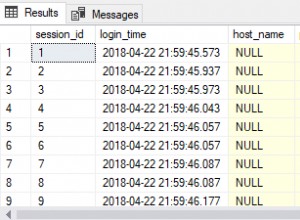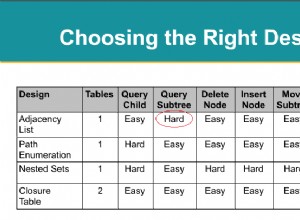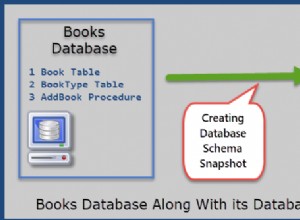Dio, questo è stato un incubo. Finalmente l'ho capito e, in retrospettiva, è qualcosa a cui avrei dovuto pensare prima. Ecco cosa ha funzionato per me nel caso qualcun altro avesse un problema simile in futuro.
Il problema è che l'ID incorporato di Table2 veniva mappato direttamente alle stesse entità dell'ID incorporato di Table1. Questo è quello che voglio con il database, ma non quello che voglio con Hibernate. Invece, i due campi per TableA e TableB devono essere rappresentati dalla stessa Table1 e l'associazione esegue l'override scritta in modo che corrisponda. Devono includere insertable=false e updatable=false in modo che Table2 non possa apportare modifiche a Table1. Nel mio caso, voglio solo una relazione unidirezionale. Table1 può quindi usare il parametro mappedBy dell'annotazione @OneToMany per eseguire il mapping direttamente a se stesso. Ciò consente a Table1 di controllare la relazione. Quindi, il codice dovrebbe essere:
@Entity
@AssociationOverrides({
@AssociationOverride(name = "pk.tableA",
joinColumns = @JoinColumn(name = "FK_TABLE_A", nullable=false)),
@AssociationOverride(name = "pk.tableB",
joinColumns = @JoinColumn(name = "FK_TABLE_B", nullable=false)) })
@Table(name="TABLE1")
public class Table1 extends BaseObject implements Serializable
{
private static final long serialVersionUID = 1L;
private Table1Id pk = new Table1Id ();
@EmbeddedId
public Table1Id getPk() {
return pk;
}
public void setPk(Table1Id pk) {
this.pk = pk;
}
private TableC tableC;
@ManyToOne
@JoinColumn(name = "FK_TABLE_C", referencedColumnName = "ID", nullable = true)
public TableC getTableC() {
return this.tableC;
}
public void setTableC(TableC tableC) {
this.tableC = tableC;
}
private List<Table2> table2s;
@OneToMany(mappedBy="pk.table1", cascade = {CascadeType.ALL}, orphanRemoval=true, fetch=FetchType.EAGER)
public List<Table2> getTable2s() {
return table2s;
}
public void setTable2s(List<Table2> table2s) {
this.table2s= table2s;
}
@Override
public boolean equals(Object o) {
...
}
@Override
public int hashCode() {
...
}
@Override
public String toString() {
...
}
}
@Entity
@AssociationOverrides({
@AssociationOverride(name = "pk.table1",
joinColumns = {
@JoinColumn(name = "FK_TABLE_A", nullable=false, insertable=false, updatable=false),
@JoinColumn(name = "FK_TABLE_B", nullable=false, insertable=false, updatable=false)
}),
@AssociationOverride(name = "pk.tableD",
joinColumns = @JoinColumn(name = "FK_TABLE_D", nullable=false)) })
@Table(name="TABLE2")
public class Table2 extends BaseObject implements Serializable
{
private static final long serialVersionUID = 1L;
private Table2Id pk = new Table2Id();
@EmbeddedId
public Table2Id getPk() {
return pk;
}
public void setPk(Table2Id pk) {
this.pk = pk;
}
private Double value;
@Column(name = "VALUE", nullable = false, insertable = true, updatable = true, precision = 2)
@Basic
public Double getValue() {
return this.value;
}
public void setValue(Double value) {
this.value = value;
}
@Override
public boolean equals(Object o) {
...
}
@Override
public int hashCode() {
...
}
@Override
public String toString() {
...
}
}
@Embeddable
public class Table2Id extends BaseObject implements Serializable
{
private static final long serialVersionUID = 1L;
private Table1 table1;
@ManyToOne
@JoinColumn(nullable=false)
public Table1 getTable1() {
return this.table1;
}
public void setTable1(Table1 table1) {
this.table1 = table1;
}
private TableD tableD;
@ManyToOne
@JoinColumn(nullable=false)
public TableD getTableD() {
return this.tableD;
}
public void setTableD(TableD tableD) {
this.tableD = tableD;
}
@Override
public boolean equals(Object o) {
...
}
@Override
public int hashCode() {
...
}
@Override
public String toString() {
...
}
}




